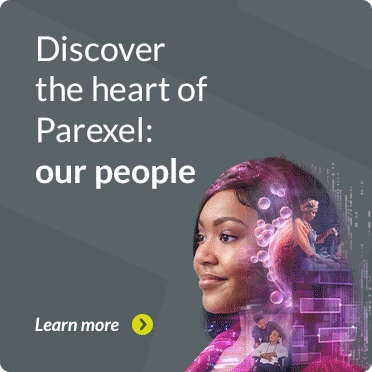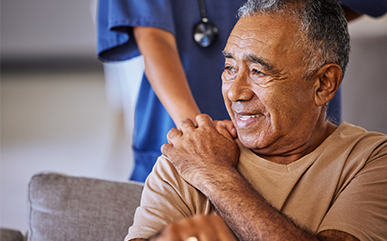New CNS Franchise Leader brings experience from pharma and as a clinician and researcher
Andreas Lysandropoulos grew up around neuroscience and now works to solve unmet needs for patients.
Andreas Lysandropoulos, MD, Ph.D., joined Parexel Nov. 1 as Global CNS Franchise Leader in Global Medical Services. Based in Brussels, Belgium, Andreas brings more than 15 years’ experience in the pharmaceutical industry and as a clinician and researcher.
What is your background in healthcare and clinical research?
I consider myself to be a citizen of the world. I was born in Greece and studied medicine in Athens. I then moved to Switzerland for lab research and to specialize in neurology with focus on neuroimmunology. As part of my training, I also spent a year in Brussels doing neurophysiology. Following my residency and Ph.D. with focus on neuroimaging, I led the Neuroimmunology Unit at the University Hospital in Brussels for five years and in late 2016 I moved to the pharmaceutical industry, joining Sanofi Genzyme as European Medical Director in Multiple Sclerosis. A few years later, I joined Ipsen as a Global Medical Director in Paris, then moved to Boston and was promoted to Head of Medical Affairs in Neuroscience. This role enabled me to become more involved in clinical research across a broader therapeutic area and learn more about the operational and regulatory aspects development.
The COVID pandemic made me realize we need to reimagine the way research works and bring safe and effective medicines to patients more quickly.
What drew you to focus on neuroscience specifically?
My father is a neurologist and psychiatrist, so I grew up around neuroscience. “Brain is the King,” he used to tell me. There’s so much in neuroscience that we don’t know, and I find this very attractive. Yet, this is an area where we’ve had a revolution in the last 30 years in terms of knowledge and treatments. There are still huge unmet needs for patients, especially the aging population with cognitive challenges, for example. The big enigma is diagnosing diseases in a pre-symptomatic phase and repairing the damages early. By the time symptoms appear, severe irreversible damage has already occurred.
What are your priorities over the next six months?
My top priority is to focus externally and maximize our opportunities to share our great expertise in CNS and work on projects in areas of high unmet need. I am already amazed by the talent and dedication I see within the cross-functional Parexel CNS team, and am sure that by strengthening our team bonds and leveraging our expertise optimally, we will be even more successful.
I’m looking forward to working closely with all our colleagues involved in neuroscience so that we make this therapeutic area the most successful and fun at Parexel!
What are the largest areas of opportunity for drug development in neuroscience?
While the world witnessed a revolution in neuroscience therapeutics in the last decades, there is still no cure for almost all neuropsychiatric disorders. That is the biggest challenge and opportunity ahead of us. After a series of disappointments in development, we live in the dawn of a new era in neuroscience characterized by advances in both pre-clinical and clinical research. The latter includes significant progress on clinical trials’ design, meaningful outcomes for patients, biomarkers, wearables, and real-world evidence. There is still a long way to be covered, but we are part of an exciting journey.
Finally, I believe it is important to call out the need for special attention to rare neurological disorders, pain, and mental and cognitive disorders that all represent conditions of high unmet need for patients and families, but also areas where innovation in the way clinical research is being conducted should be a priority.
At Parexel, we do everything “With Heart.” How are you thinking about that in terms of your role?
For me, “With Heart” means with passion and empathy. It is my mission to gather people around a common cause and inspire everybody to reflect on and be passionate about what we do together because it matters to patients who rely on us all for a better life.
What do you enjoy doing outside of work?
As a Greek, I love gatherings with good food and loud conversations. I also enjoy movies, reading, and traveling, especially to peaceful places in nature. I’m a social media guy, which feeds my curiosity.
Related Insights
Webinar
Incorporating the Patient Voice: How Patient Insights Drive Trial Design and Outcome Measures in Schizophrenia Research
Oct 30, 2024
Report
New Medicines, Novel Insights: Accelerating the new frontiers in neuroscience
Oct 28, 2024
Blog
Parkinson’s Disease Patient Advocacy Q&A
Sep 18, 2024
Webinar
Alzheimer’s Disease vs Multiple Sclerosis Drug Development: Similarities, Differences & New Perspectives
Aug 22, 2024
Podcast
Enabling Successful Sites, Episode 2: Empowering Sites to be More Inclusive Through Cultural Sensitivity Training
Jun 28, 2024
Podcast
De-risking Drug Development | Episode 1: How to drive value in pre-clinical development
May 28, 2024
Blog
Deriving meaningful insights from real-world data for diverse Alzheimer’s research studies
Mar 19, 2024
Blog
Opportunities and strategies for accelerating patient access to treatments for Alzheimer’s disease
Feb 23, 2024
Blog
As more neuroscience drugs are approved, the value proposition takes center stage
Feb 14, 2024
Blog
How sponsors can make it easier for rare disease patients and families to participate in trials
Feb 13, 2024
Blog
How we can bring gene therapies to bear on diseases of aging
Jan 31, 2024
Blog
Improving and accelerating clinical research in dementia by integrating the patient’s voice throughout the development journey
Jan 24, 2024
Related Insights
Webinar
Incorporating the Patient Voice: How Patient Insights Drive Trial Design and Outcome Measures in Schizophrenia Research
Oct 30, 2024
Report
New Medicines, Novel Insights: Accelerating the new frontiers in neuroscience
Oct 28, 2024
Blog
Parkinson’s Disease Patient Advocacy Q&A
Sep 18, 2024
Webinar
Alzheimer’s Disease vs Multiple Sclerosis Drug Development: Similarities, Differences & New Perspectives
Aug 22, 2024
Podcast
Enabling Successful Sites, Episode 2: Empowering Sites to be More Inclusive Through Cultural Sensitivity Training
Jun 28, 2024
Podcast
De-risking Drug Development | Episode 1: How to drive value in pre-clinical development
May 28, 2024
Blog
Deriving meaningful insights from real-world data for diverse Alzheimer’s research studies
Mar 19, 2024
Blog
Opportunities and strategies for accelerating patient access to treatments for Alzheimer’s disease
Feb 23, 2024
Blog
As more neuroscience drugs are approved, the value proposition takes center stage
Feb 14, 2024
Blog
How sponsors can make it easier for rare disease patients and families to participate in trials
Feb 13, 2024
Blog
How we can bring gene therapies to bear on diseases of aging
Jan 31, 2024
Blog
Improving and accelerating clinical research in dementia by integrating the patient’s voice throughout the development journey
Jan 24, 2024






